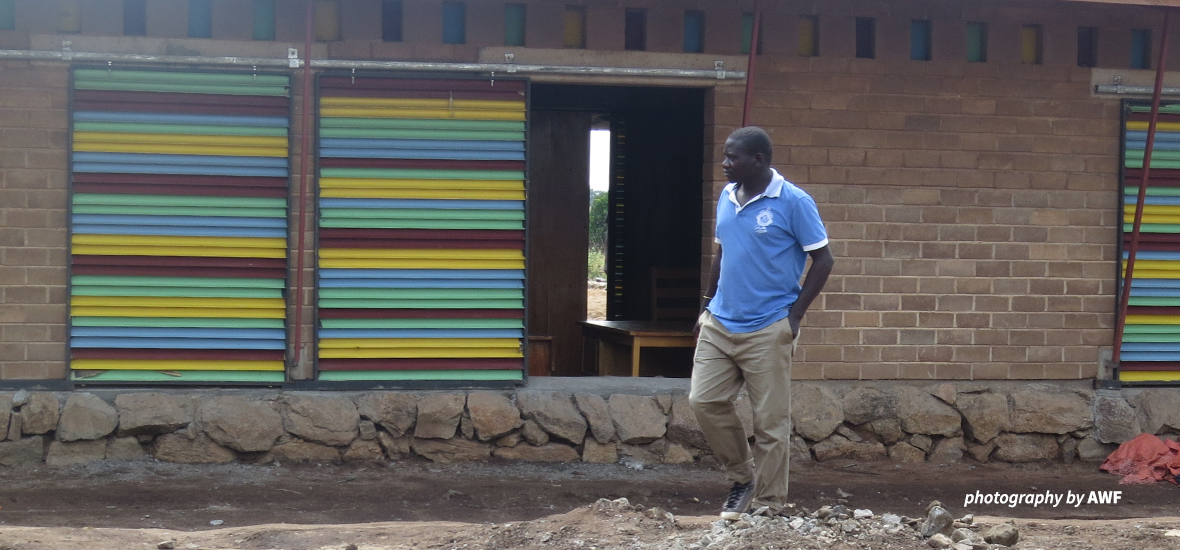A civil engineer champions Classroom Africa: “Education is the bedrock of African leadership”

Kidepo Project Officer Timothy Okudu facilitated a session during Kidepo's landscape strategy development workshop in 2022.
Chance Conservationists is a series highlighting AWF staff who have embraced people-centered conservation in their professions despite coming from diverse academic fields. These remarkable individuals now espouse conservation values to propel the organization’s vision for sustainable development and biodiversity protection.
Kidepo Project Officer Timothy Okudu joined AWF in 2018 as a clerk of works to supervise the construction of the two Classroom Africa schools in the Kidepo landscape, Sarachom Primary School and Kidepo Primary School. Timothy holds a bachelor’s degree in civil engineering from one of Uganda’s most prestigious universities, Kyambogo University, and he has recently completed an MBA at Amity University. He has practiced civil engineering since 2010; however, the two-year project at AWF is one that resonated with his hidden passion for serving communities.
How does a civil engineer like yourself find himself in the position you hold now?
Engineering can either be pro- or anti-conservation. During my two years as a clerk of works, I was intrigued by AWF’s conservation model: having the local communities at heart, giving them alternative livelihoods, but most importantly, the concept of the schools. The schools’ construction had a green footprint, and we used 70 percent natural material, leaving the environment intact. Witnessing the community’s active participation and ownership of the project, I was sure I needed to do more. I found myself participating in so many community meetings, having interactions with Uganda Wildlife Authority and the pupils that were to benefit from the schools.
Engineering comes with a lot of project management work, which made my transition to the project officer role very smooth. When the opportunity came up in 2021, I seized it, and I have not looked back.

Timothy inspected a Classroom Africa school construction site as a clerk of works.
Tell us about your passion for conservation education.
Conservation education was my entry point into AWF because I joined to oversee the construction of the schools. I believe conservation is undoubtedly hinged on knowledge, and I am wholly sold to AWF’s belief that education is the bedrock of African leadership. Unlike other interventions whose impact is farfetched, erecting the two schools in the landscape was a landmark which attests to the high influx of pupils.
The activities we organize, like trips to the national park, leave me fascinated. Giving a child that has grown up in the landscape a firsthand debut experience to witness how peaceful wildlife can be when not interfered with—getting to understand their immediate environment and broader conservation issues is key. It’s these priceless impressions that will build a knowledgeable cluster of future custodians of the environment.
I believe that the face of conservation in the next 50 years in the Kidepo landscape will be distinct because of the impact AWF’s interventions through conservation education will have had.
What impact has your current role in conservation had on your engineering career?
Now that I am a conservationist at heart, I believe I will practice engineering with a conservation mindset. Implementing conservation activities, learning from my colleagues and local communities has had a lasting impact on how we should treat nature. I have had to enroll for short courses in conservation to broaden my knowledge. I am also keenly looking at exploring conservation engineering.
AWF’s Charles R. Wall nine-month inaugural Conservation Leadership and Management Fellowship is another golden opportunity I have gripped on that will impart transformational leadership and management skills I need to lead systemic impact in environmental issues.
I implore everyone to be mindful of their impact on the environment, regardless of their walk of life. Every action either adds or takes away from nature.